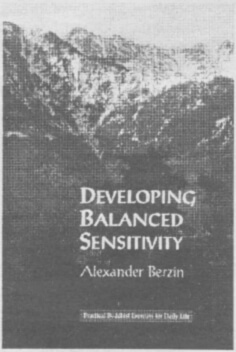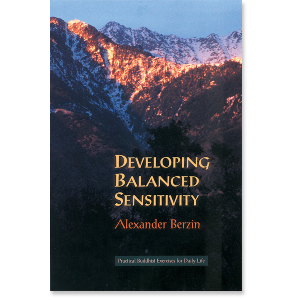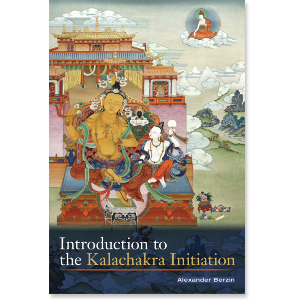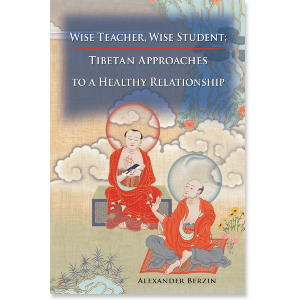| The following article is from the Winter, 1999 issue of the Snow Lion Newsletter and is for historical reference only. You can see this in context of the original newsletter here. |
An Article From Tricycle: the Buddhist Review

by John Pettit
What do you get when you cross Abhidharma (Buddhist psychology) with Lojong (a Tibetan Buddhist tradition of spiritual transformation), many it to the contemporary Western tradition of self-help, and dress up the hybrid offspring as a workshop manual? You get Developing Balanced Sensitivity, by Alexander Berzin, which, in spite of its unusual and ingenious format, is unmistakably a guide to Buddhist practice.
In recent years, a number of seasoned Western translators of Tibetan Buddhism have begun to write innovative books about Buddhist philosophy, practice, and culture. This trend min ors the Tibetan scholarly custom of writing commentaries on the classics before venturing into original composition. However, unlike Tibetan contemplatives who see themselves as transmitters of tradition, many Western scholars have cast themselves in the role of re-interpreters of existing traditions. Witness, for example, the controversial marriage of Buddhism with existentialism in Stephen Batchelor's Alone with Others, the creative history some would say revisionism in Robert Thurman's Inner Revolution, or the potent cultural criticism in Donald Lopez's Prisoners of Shangri-La.
While these authors are all concerned with the assimilation of Buddhist philosophy and Tibetan culture in the West, what Berzin does here is explore practical aspects of transforming the mind, primarily in a Tibetan Buddhist context, but using language accessible to anyone with an interest in spiritual development. Thus, Berzina Harvard Ph.D. in Buddhist Studies has written primarily as a translator and transmitter of traditional ideas, rather than as a critic or self-appointed cultural revolutionary. It is the language he chooses, not his agenda, that marks him as an innovator.
Berzin's personal study and practice of Tibetan Buddhism is founded in the Gelug tradition, but as anyone familiar with his many translations, published by the Library of Tibetan Works and Archives, will know, he has also studied the other schools of Tibetan Buddhism, particularly the Nyingma Great Perfection and the Kagyu Mahamudra. Accordingly, while much of Berzin's discussion has the kind of analytical rigor to be expected from a Gelug scholar, he also invokes theories and methods typical of the latter traditions. The keynote here is cultivating a balanced approach to self-understanding.

On the whole, it could be said his approach has attained a sensitive balance of its own: intellectually lucid and eminently practical.

In his preface, Berzin suggests that sensitivity, or the lack thereof, is a universal human concern. His book is addressed both to experienced meditators who have reached a plateau in the integration of their practice with daily life arid to anyone who might have a sensitivity disorder. Included in this latter category are all those people who either emotionally over-react hypersensitive or simply shut down insensitive. This would seem to cover pretty much everyone.
In the first chapter, Berzin notes that balanced sensitivity has two components: attentiveness and responsiveness. Two additional factors, empathy and understanding, promote balanced sensitivity. In the remainder of the chapter, he analyzes the various ways in which hypersensitivity and insensitivity show up in our experience and behavior. The ramifications of the ideas and practices set forth here are then explored in depth in the twenty-one chapters that follow, and are supplemented with exercises that may include a partner.
Berzin refers to the concepts and methods of Tibetan Buddhism throughout the book. For example, the traditional meditative exercises of calming the mind (shamatha) and discerning awareness (vipashyana) are discussed at length. Nonetheless, in keeping his focus on sensitivity, which he defines as nurturing oneself without being selfish and eating for others without being manipulative, the central problem sensitivity disorder and its solution various techniques for balancing sensitivity are for the most part discussed in the language of everyday experience and relationship.
The structure of the book is informed by a traditional form of Tibetan contemplation on emptiness, what Berzin calls the four-point analysis. First, the problem a distorted sense of self is identified. Next, techniques for dispelling the problem such as analysis and meditation are studied. Finally, steps are taken to eliminate the two extreme positions, which I assume to be those of eternalistic projection (manifesting as hypersensitivity) and nihilistic denial (manifesting as emotional withdrawal or insensitivity). It is an arrangement roughly corresponding to the familiar Tibetan Buddhist triad of View, Meditation, and Conduct.
As Berzin notes in the second chapter, there are both rational and intuitive types of individuals. The rational type will naturally rejoice in the organization and analytical precision of this book. A more practical or intuitive person, who might otherwise be put off by this book, will find its highly germane examples and exercises rewarding. Both the rational and intuitive approaches are valid, according to the author; indeed, he maintains that they must be combined in order to develop balanced sensitivity.
Throughout the book, the author has translated the concepts and methods of Tibetan Buddhism into language any reader can understand. But this is not to say that he has dumbed down the material. The deceptively sophisticated concept of sensitivity, in particular, is treated with finesse. A skillful writer, Berzin has pulled off the tricky feat of addressing an enidite discussion of Buddhist psychology to the here and now without falling into either psycho-babble or translationese. On the whole, it could be said his approach has attained a sensitive balance of its own: intellectually lucid and eminently practical.
John Pettit has a Ph.D. in Buddhist Studies from Columbia University and translates Tibetan texts.
Developing Balanced Sensitivity
$27.95 - Paperback







